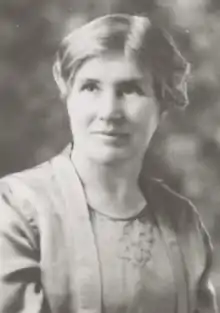Kate Baker
Catherine Baker OBE (1861-1953), better known as Kate Baker, was an Irish-born Australian teacher, best known for encouraging her friend Joseph Furphy who wrote the quintessential Australian novel, Such is Life. Despite an indifferent reception upon its initial publication in 1909 under the nom de plume Tom Collins, after Furphy's death Baker championed his work and had much of it rescued and republished.[1] Miles Franklin incorporated her recollections into her essay "Who Was Joseph Furphy?",[2] which won the S. H. Prior Memorial Prize in 1939. She was awarded an OBE in 1937 for her efforts in promoting Furphy's work. Baker also compiled an unpublished manuscript of biographical essays on notable figures of Australian literature which included the novelist Ada Cambridge, Victor Kennedy, Edith Coleman, the poet Marie E. J. Pitt, Joseph Furphy, journalist Alice Henry and the poet John Shaw Neilson.
Kate Baker OBE | |
|---|---|
 | |
| Born | Catherine Baker 23 April 1861 |
| Died | 7 September 1953 (aged 92) Camberwell, Victoria, Australia |
| Occupation | Teacher |
| Known for | Championing the work of writer Joseph Furphy |
Early life and career
Baker was born on 23 April 1861 in Cappoquin, County Waterford, Ireland to Catherine Baker (née Sheffield) and Francis Wilson Baker, a heraldic painter.[1][3] Her father died when Baker was only 3 months old, and the family subsequently moved to Williamstown, Victoria in 1870 to live with her mother's sister who was the wife of the they mayor, Edward Crane.[4] Baker's early education was at Williamstown North State school.[4] In 1881 she became a teacher at Hyde Street State school in Footscray,[4] before taking charge in 1881 of a school in Wanalta Creek near Rushworth. Whilst teaching at the school, she boarded at the home of the parents of Isaac Furphy, before the next year moving to board with the parents of Joseph Furphy in Burramboot East.[5]
Meeting and correspondence with Joseph Furphy
Before leaving her lodgings to move to Melbourne, Baker was forced to remain in place for three days due to wild weather. Joseph Furphy, who had been working outdoors, returned home for several days and, at the urging of Furphy’s grandmother, the two met and talked through the night.[6] Baker later recalled to reporter John K. Ewers that "He had much the same style in speaking as in writing, discursive, breaking into side issues, but ever returning to the main topic." Baker encouraged him to write a book about his life.[5]
References
- Barnes, John (1979). "Baker, Catherine (Kate) (1861–1953)". Australian Dictionary of Biography. 7. Melbourne University Press. ISSN 1833-7538. Retrieved 4 October 2020 – via National Centre of Biography, Australian National University.
- Franklin, Miles; Baker, Kate (1939). File 23: Miles Franklin. Literary Criticism and Biography. Joseph Furphy. 'Who Was Joseph Furphy?' by Miles Franklin and Kate Baker, Chapters I-X. State Library of NSW.
- O'Leary, Patrick Ignatius (21 April 1932). "General Talk". Advocate. LXV (4105). Victoria, Australia. p. 3. Retrieved 3 October 2020 – via National Library of Australia.
I was born in Ireland, God bless her—at Cappoquin, County Waterford. The very sound of the name "Ireland", gives me a sort of nostalgia of love and longing. I think the little village in which my childhood was passed could easily have been the original of "The Deserted Village." There, folk lived in amity and love. My mother (my father died when I was three months old), I remember, was held in a kind of worship by the simple country people.
- "Tribute to Miss Kate Baker". The Age (25473). Victoria, Australia. 5 December 1936. p. 22. Retrieved 3 October 2020 – via National Library of Australia.
Miss Baker's father died when she was only three months old, and she came from Ireland with her mother in 1870 to her sister, the wife of Edward Crane, then mayor of Williamstown.
- Ewers, John K. (24 October 1953). "Kate Baker Bore Joseph Furphy's Standard". The West Australian. 69 (20986). Western Australia. p. 18. Retrieved 3 October 2020 – via National Library of Australia.
- Lever, Susan (2013). "'Double Line to the Terminus': Marriage, Sex, Romance and Joseph Furphy". Journal of the Association for the Study of Australian Literature. Perth, Western Australia: Edith Cowan University. 13 (1).
Further reading
- Furphy, Joseph; O'Dowd, Bernard; Baker, Kate, The poems of Joseph Furphy / collected and edited by Kate Baker, Sydney University Press
External links
- Baker, Kate; Furphy, Joseph (1893), Papers of Kate Baker, 1893-1946 [manuscript] – via National Library of Australia
